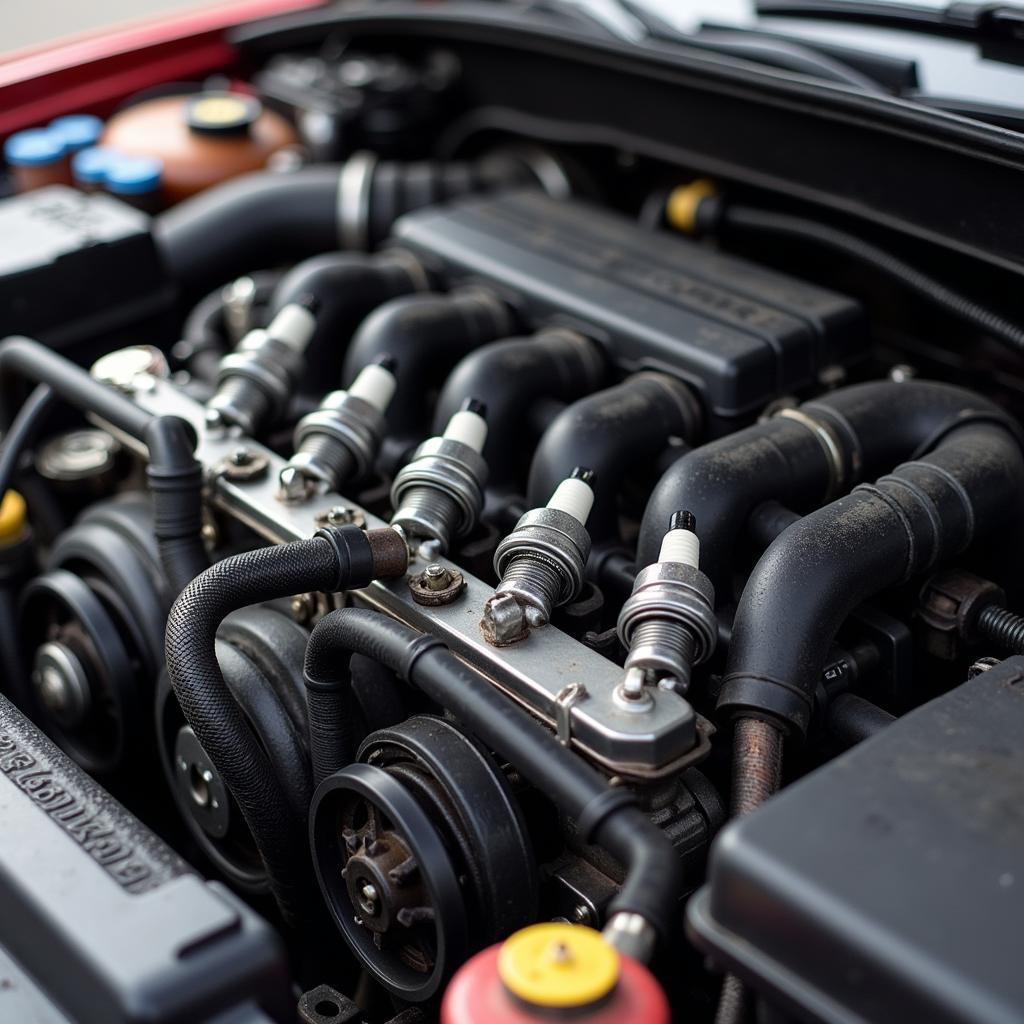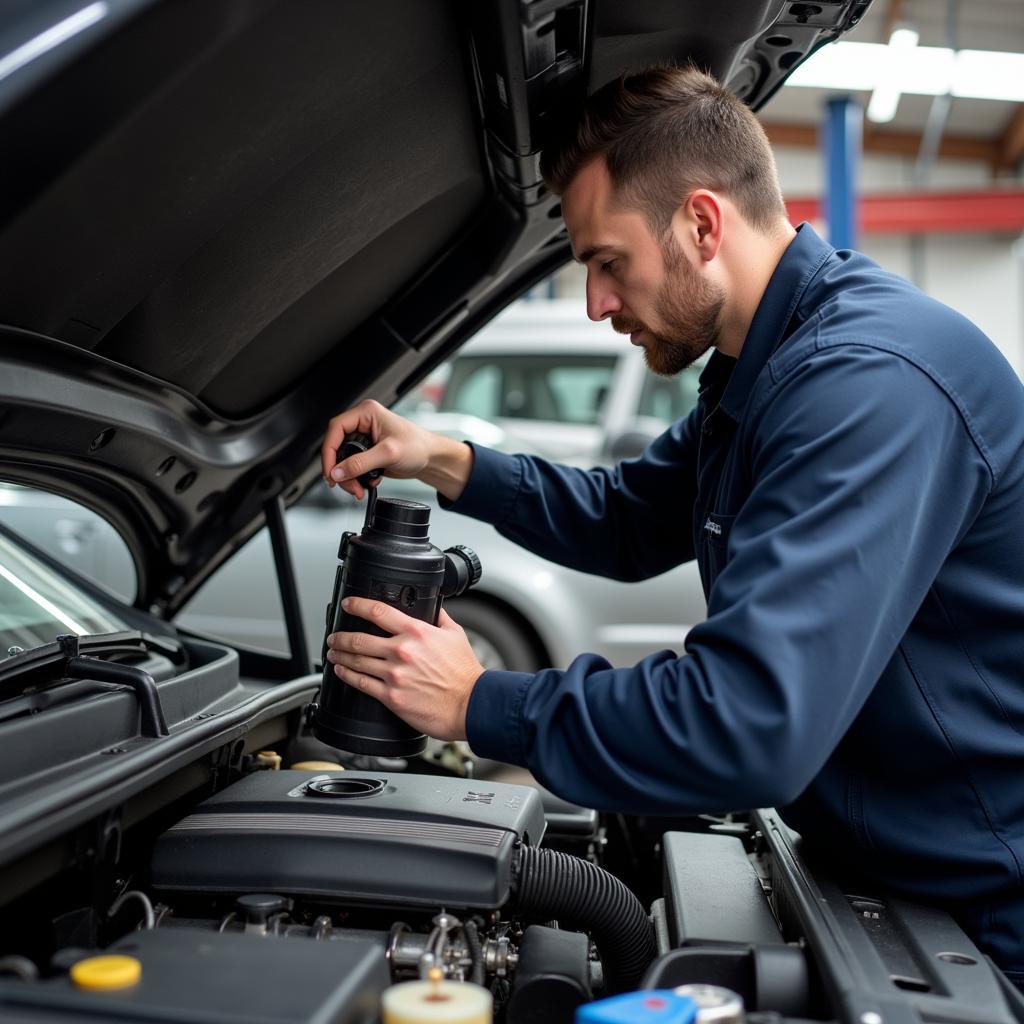How to Service Car Engine: A Comprehensive Guide
Knowing how to service your car engine is crucial for maintaining its performance, extending its lifespan, and avoiding costly repairs. While a professional mechanic is always the best option for complex issues, understanding the basics of car engine service can empower you to address minor maintenance tasks yourself. This guide will delve into the essentials of servicing your car engine, providing you with the knowledge and confidence to keep your vehicle running smoothly.
Understanding the Importance of Regular Car Engine Service
 Car Engine Components
Car Engine Components
Regular car engine service is not just about keeping your car running; it’s about maximizing its performance, fuel efficiency, and longevity. Just like any complex machine, your car engine requires consistent upkeep to prevent wear and tear, identify potential issues early on, and ensure all components function harmoniously.
Essential Car Engine Service Tasks You Can Do
Before diving into specific tasks, it’s essential to consult your owner’s manual for recommended service intervals and procedures specific to your car model.
Here are some essential car engine service tasks you can perform:
1. Checking and Changing the Engine Oil
Engine oil is the lifeblood of your car, lubricating moving parts, reducing friction, and preventing overheating.
- Check Oil Level: Locate the engine oil dipstick (usually marked with a yellow handle), pull it out, wipe it clean, reinsert it fully, and remove again. The oil level should be between the minimum and maximum marks.
- Change Oil and Filter: This typically involves draining the old oil, replacing the oil filter, and adding fresh oil. The frequency of oil changes depends on your driving habits and the type of oil used, but it’s generally recommended every 3,000 miles or 3 months.
2. Inspecting and Replacing Air Filter
The air filter ensures clean air reaches the engine for optimal combustion. A clogged air filter can reduce engine performance and fuel efficiency.
- Locate the Air Filter Housing: Consult your owner’s manual for its location.
- Inspect and Replace: Remove the old air filter and visually inspect it. If it’s dirty or clogged, replace it with a new one.
3. Checking and Topping Up Engine Coolant
Engine coolant prevents the engine from overheating by regulating its temperature.
- Locate the Coolant Reservoir: This is usually a translucent plastic tank with minimum and maximum markings.
- Check and Top Up: If the coolant level is below the minimum mark, carefully add a 50/50 mixture of coolant and distilled water until it reaches the appropriate level.
4. Inspecting Belts and Hoses
Belts and hoses play vital roles in the engine’s operation, from powering the alternator to circulating coolant.
- Visually Inspect: Look for cracks, fraying, looseness, or signs of wear and tear on belts and hoses.
- Replace if Necessary: If you notice any damage, it’s best to replace the affected belts or hoses promptly.
 Mechanic Inspecting Engine
Mechanic Inspecting Engine
When to Seek Professional Car Engine Service
While the tasks listed above can be handled by car owners with basic mechanical skills, certain situations warrant professional attention:
- Warning Lights: If your check engine light or any other warning light on your dashboard illuminates, it’s crucial to consult a mechanic promptly.
- Unusual Noises: Strange noises emanating from the engine, such as knocking, grinding, or screeching, should be addressed by a professional.
- Performance Issues: If you experience significant performance problems, including loss of power, reduced fuel efficiency, or difficulty starting, it’s essential to seek professional help.
Tips for Maintaining Your Car Engine Between Services
- Warm Up the Engine: Allow your car engine a brief warm-up period, especially during colder months, before driving off.
- Avoid Aggressive Driving: Hard acceleration and abrupt braking can put unnecessary strain on the engine.
- Use High-Quality Fuel: Using the recommended octane rating fuel for your car can optimize engine performance and longevity.
Conclusion
Regular car engine service is fundamental to keeping your vehicle running smoothly, efficiently, and safely. By understanding the basics of car engine maintenance and performing routine checks, you can extend the life of your engine, avoid costly repairs, and enjoy a more reliable driving experience. Remember to consult your owner’s manual for specific recommendations for your car model, and don’t hesitate to seek professional assistance for complex issues or when in doubt.

